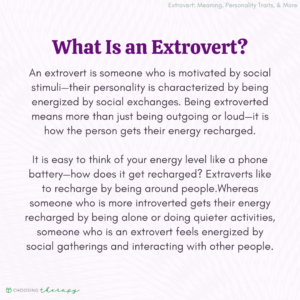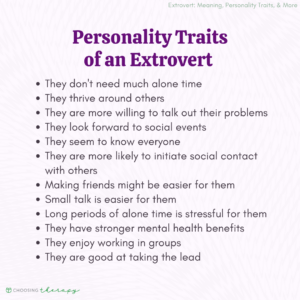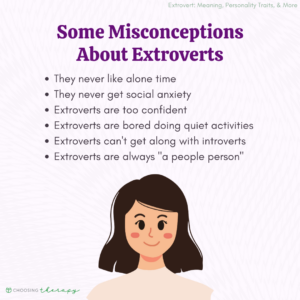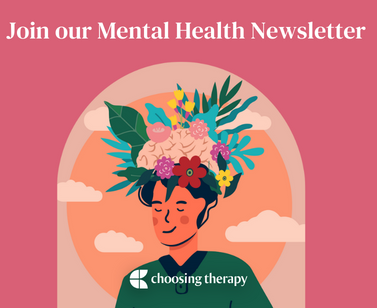
Extraversion is a personality type that defines people who get their social batteries charged by spending time with others. Do you feel energized when spending time with others? Do you look forward to going out and sharing a social experience, or does the thought of doing that overwhelm you? If you get excited and energized in social activities, you might be an extrovert.
Would you like to try therapy? BetterHelp has over 20,000 licensed therapists who provide convenient and affordable online therapy. BetterHelp starts at $65 per week. Take a Free Online Assessment and get matched with the right therapist for you.
What Is an Extrovert?
An extrovert is someone who is motivated by social stimuli- their personality is characterized by being energized by social exchanges.
Being extroverted means more than just being outgoing or loud- it is how the person gets their energy recharged. It is easy to think of your energy level like a phone battery- how does it get recharged? Extroverts like to recharge by being around people.Whereas someone who is more introverted gets their energy recharged by being alone or doing quieter activities, someone who is an extrovert feels energized by social gatherings and interacting with other people.
Extroversion Vs. Introversion
Extroversion and introversion are both personality traits that define the way that someone receives and recharges their energy. Coined by Swiss psychologist Carl Jung in 1921, the terms extroversion and introversion were originally used to define the different ways that individuals direct their inner and outer energy.
However, today mental health clinicians understand that there is a lot more to a person’s personality than a binary extrovert/introvert explanation. For example, we now understand that people fall anywhere along the vast personality spectrum, such as highly sensitive people, or autistic or neurodivergent people. Some researchers even consider introversion to be an extension of the autism spectrum, due to it’s traits of neurodivergence. “When introversion and autism are placed on the same continuum, the nature of the relationship of the traits becomes more apparent, and new possibilities are available for exploration of both autism and introversion.”1
12 Personality Traits of an Extrovert
Think about your friends and others in your social circle. You can probably point out who seems extroverted by the way that they act in social settings or when you are all out as a group of friends. Are they outgoing, or perhaps they are known as the life of the party? Although not all people who are outgoing are necessarily extroverted, this is one of the common characteristics and traits of extroverts.
Below are 12 common personality traits of an extrovert:
1.They Don’t Need Much Alone Time
Unlike introverts, who need alone time in order to recharge their energy, extroverts generally do not need as much alone time as others do. Some people who identify as high on the extraversion spectrum might not need any alone time at all, and might even generally prefer being with others all of the time, and might become anxious when they have too much alone time.
2.They Thrive Around Others
It is generally understood that extroverts love being around others and staying social because this replenishes their energy. Being in social environments where they are meeting and engaging with new people is energizing to them. However, this does not mean that all extroverts are the same- some extroverts feel overwhelmed in social situations such as when they have to meet new people or during work events where they might have to impress bosses or coworkers.
3. They Are More Willing to Talk Out Their Problems
Although many introverts will also prefer to talk about their problems with a close confidant or therapist, an extrovert may be more willing to share their thoughts, feelings, and emotions with others. Unfortunately, for some, this might be how they deal with relationship conflict. If this is the case, setting healthy boundaries is essential.
4. They Look Forward to Social Events
“Extroverts have a preference for seeking, engaging in, and enjoying social interactions,” (Fishman et al 2011) and are more likely to look forward to the social events and gatherings that their more introverted peers are dreading.
5. They Seem to Know Everyone
Think back to that friend who you identified above as being stereotypically extroverted. You probably picked someone who was social; perhaps they seem to know a lot of people. Although knowing a lot of people does not automatically mean someone or extrovert, extroverts are more likely to remember names and faces of those they meet. (Haj et al. 2021.)
6. They are More Likely to Initiate Social Contact With Others
Extroverts usually appear more confident, especially in social situations, than their more introverted counterparts. Because they are more motivated by human faces and human interactions, they are more motivated to engage in and initiate social contact with others around them.2 This is probably why the more extroverted friend in the social group might be the one who usually suggests getting together.
Top Rated Online Therapy Services BetterHelp – Best Overall “BetterHelp is an online therapy platform that quickly connects you with a licensed counselor or therapist and earned 4 out of 5 stars.” Visit BetterHelp Online-Therapy.com – Great Alternative In addition to therapy, all Online-Therapy subscriptions include a self-guided CBT course. Visit Online-Therapy.com
7. Making Friends Might be Easier for Them
Because of their ability to recognize faces and remember names, as well as their desire to engage with people socially, extroverts have an easier time making friends and social connections. Without struggling with what to say, or being overwhelmed by the social interactions, extroverts have fewer barriers to making friends.
8. Small Talk is Easier for Them
At social gatherings, extroverts are comfortable making small talk with those around them, never having a shortage of topics to address. Whereas their introverted peers might find conversations about the weather or the food being served pointless or even stressful, extroverts enjoy these interactions.
9. Long Periods of Alone time Is Stressful for Them
Many extroverted people struggled more during the pandemic lock down than introverted people. Video meetings instead of in person, working from home, and the lack of interaction with others was stressful for those who thrive on engaging with others.
10. They Have Stronger Mental Health Benefits
In a 2021 study on the personality traits that predict stronger mental health benefits, it was concluded that “people who score higher in extraversion traits, tend to have greater mental health.”3 This is likely due to the stronger social connections and lack of stress and overwhelm associated with interaction that many introverts and neurodivergent people experience.
11. They Enjoy Working in Groups
While the thought of having to work in a group for a project might give many introverts stress, extroverts enjoy the stimulation and energy that comes from group interactions and group activities. They much prefer this to solo projects.
12. They are Good at Taking the Lead
Many extroverts are effective leaders. Because they usually appear more confident, they are often thought of in a leadership role, and are more comfortable taking the lead for group projects or planning social outings.
Pros & Cons of Being an Extrovert
Being an extrovert can be a beautiful thing, but no personality trait is perfect. Being extroverted can have its drawbacks for certain individuals, and can sometimes come with negative social implications.
Benefits and drawbacks of being an extrovert may include:
| Benefits | Drawbacks |
|---|---|
| You are less likely to have social anxiety | You might be easily bored by quiet activities |
| You make friends easily. | Your desire for a lot of social contact might seem overwhelming to some |
| You might excel at public speaking and performing- or at least being in a public space. | You may be seen as theatrical or “too much.” |
| You are not afraid of adventure or taking risks. | You may be more likely to do something impulsive |
| You might be better at smalltalk | Others might see this as superficial |
Myths & Misconceptions About Extroversion
There are certainly many stereotypes and misconceptions about extroversion. Some of these myths stem from the stereotypes we have in society based off of extraverted characters in movies that are loud and eccentric.
Below are some misconceptions about extroverts:
- They never like alone time: This is a stereotype that often comes from the fact that extroverts prefer social activities to alone time. However, many extroverts enjoy being alone! They just need much less of it than introverts.
- They never get social anxiety: Many extroverts still have social anxiety, especially if they have to be on the spot such as giving a speech or presentation in front of a crowd. Being the center of attention is easier for some in a social setting where they do not have to get on stage and present.
- Extroverts are too confident: In some cases, extroversion can sometimes be misinterpreted as narcissism due to the person being seen as overly confident and sure of themselves.
- Extroverts are bored doing quiet activities: Extroverts can still enjoy quieter activities such as having a dinner or movie date. Like everyone else, some extroverts still experience social fatigue and might need to recharge after lots of social activities or events.
- Extroverts can’t get along with introverts: All of us have different personality traits, and this is no reason that we can not get along. We just have to learn how to understand each other and each other’s needs. It is important for an extrovert to be understanding instead of taking it personally when their introverted friend declines a social activity, for example.
- Extroverts are always “a people person”: Just because someone is extroverted does not mean that they do not get annoyed with others. Many extroverts who work in a job such as retail where they have to deal with difficult people, leave that job at the end of their shift to go hang out with other people! Being extraverted does not mean that they like all people, all the time.
Extroversion Is a Spectrum
Like all aspects of our personality, extroversion exists on a spectrum, and can change over time. Also, some people identify as an ambivert– meaning they can be both introverted and extroverted. It is normal for younger people to be more extroverted, as our social systems reinforce togetherness and friendship of young people, and peer influence greatly affects young peoples’ desire to get together in social groups.
It is important to understand that your personality, and your social needs, are just one part of who you are, and there is no need to change or alter them!
In My Experience
In my experience, extroversion is something that is reinforced in our society. As an introvert myself, I often find myself struggling in social situations that are more geared towards extroversion. Holiday company parties, dinner events, and other such social activities are very stressful for me- but easy for my extroverted friends. However, developing an understanding of my own personality needs helps to empower me by giving me a greater awareness of myself and others. Ultimately, it is important to remember that we are not defined by personality labels, and that we are who we are!
To help our readers take the next step in their mental health journey, Choosing Therapy has partnered with leaders in mental health and wellness. Choosing Therapy is compensated for marketing by the companies included below. Online Therapy BetterHelp Get support and guidance from a licensed therapist. BetterHelp has over 20,000 therapists, who provide convenient and affordable online therapy. Complete a brief questionnaire and get matched with the right therapist for you. Get Started Psychiatry, with you in mind Talkiatry Our Psychiatrists Can Diagnose Your Condition, Prescribe Medication, And Monitor Your Progress. Most psychiatry visits cost patients $30 or less* Free Assessment Drinking Moderation Sunnyside Want to drink less? Sunnyside helps you ease into mindful drinking at your own pace. Think lifestyle change, not a fad diet. Develop new daily routines, so you maintain your new habits for life. Take a 3 Minute Quiz Relationship Help OurRelationship (Free Couples Course) OurRelationship has been proven to help couples improve communication, intimacy, and trust. 94% would recommend it to a friend. Get Started Mental Health Support Group App Circles Anytime, anonymous, and free. Never feel alone during life’s greatest challenges. Drop-in to live conversations and share thoughts, ask questions, or learn from others on the same journey. Join Circles Now Free Prescription Discount Card Optum Perks Save up to 80% on most prescriptions. Optum Perks provides discounts at over 64,000 pharmacies nationwide. No memberships or costs to you, ever. It’s really that easy. Get your card and start saving. Get the discount card! *Includes copayment, deductible, coinsurance, and $0 Visits. Excludes no shows.Additional Resources
Online Anxiety Test A few questions from Talkiatry can help you understand your symptoms and give you a recommendation for what to do next. How Does ERP Help With Intrusive Thoughts? Obsessive compulsive disorder (OCD) is a psychiatric condition marked by the presence of obsessive thoughts, images, doubts, or urges, followed by compulsive behaviors or acts aimed at easing the distress caused by the obsession. While the content of the obsessions can take many forms, they are always repetitive, persistent, involuntary, and intrusive, and they often result in a great deal of anxiety for the person experiencing them.









